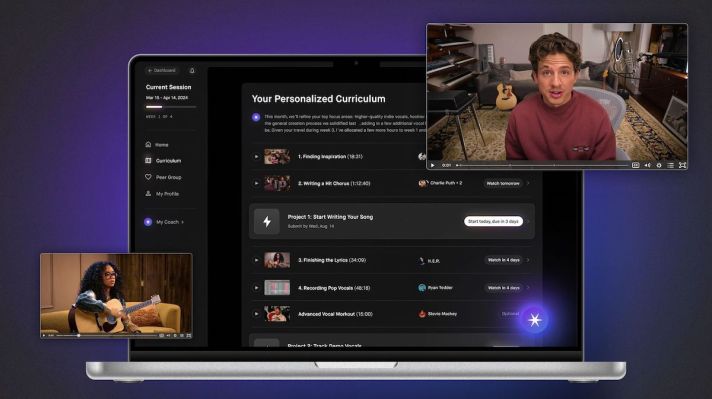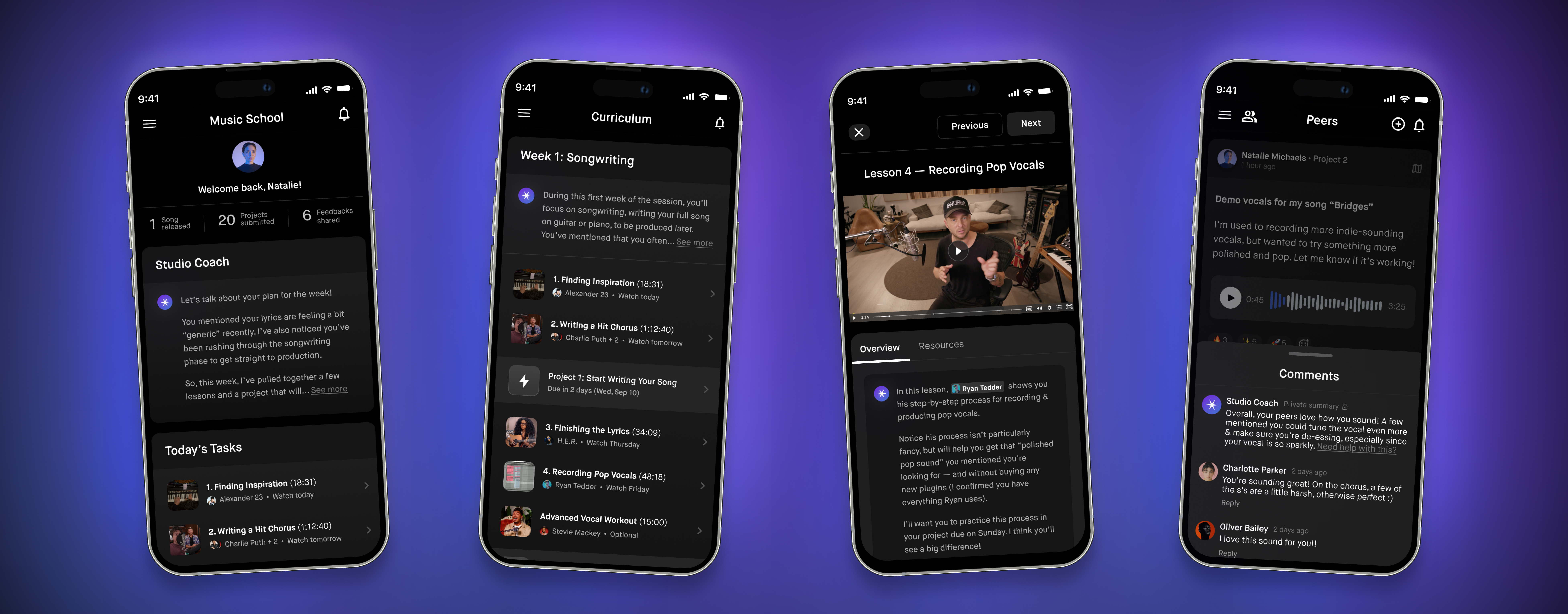MasterClass rival Studio launched today its first AI-powered online school for musicians, songwriters and producers to learn from top artists in the industry, create new songs, get feedback from like-minded peers and access Studio’s AI coach that keeps them on track with personalized schedules and deadlines.
The waitlist is officially open starting today. Studio offers two pricing options: $199 per month or $1,799 per year.
Studio’s Music School provides thousands of exclusive lessons taught by more than 110 popular artists and instructors, including Charlie Puth, Kygo, H.E.R., Idina Menzel, Pentatonix, Ryan Tedder (frontman for OneRepublic), Alexander 23, Tainy, Chelsea Cutler, Jonas Blue, Shane McAnally and Louis Bell, among others.
There are more than 100 topics to choose from, such as vocal production, songwriting, music business, sound design, music theory, cover songs and musical theater, as well as genres like alternative, classical, country, EDM, folk, hip-hop, indie pop, lo-fi, metal, R&B and more.
The online accelerator features an AI-powered coach that leverages OpenAI’s GPT-4 to deliver personalized curriculums every month based on someone’s interests, specific goals, learning style and level of experience. It can also design the curriculum around a student’s specific schedule and commitment level, so if they have a vacation, the AI coach will work around that to ensure they still make progress. Students can input a set number of hours to dedicate to their lessons.
Students are then assigned custom-built projects, and at the end of the month, they’ll leave with at least one finished, release-ready song.
In addition to GPT-4, the AI coach is powered by two proprietary frameworks, which address “GPT-4’s main limitations out-of-the-box when it comes to educational design: long-term planning, pacing, sequencing, and effective personalization,” co-founder Max Deutsch explains to TechCrunch. “GPT-4 especially struggles in educational design for creative fields, like music, where there aren’t single “correct answers” for each step of the process.”
The frameworks leverage Studio’s thousands of hours of video lessons, the expertise of Studio’s curriculum design team and years’ worth of outcome-based student data to determine which lessons, projects and peer matchings yield the best results for different types of learners.
“The combination of GPT-4 and these frameworks allow us to build highly effective, well-paced, well-sequenced and correctly personalized curriculums for our students and to proactively and effectively update these plans as students progress to keep them on track and motivated,” Deutsch added.
Lastly, there’s an algorithm that matches students with a 20-person peer group based on similar preferences, so they get weekly feedback from people who are knowledgeable of the same topics.
It should be noted that Studio’s Music School isn’t designed for beginners looking to start a career in the music industry but for creatives who already know the basics and want to enhance their skills. While no equipment is required to participate in classes, Studio says that most people already have some kind of music software or DAW (Digital Audio Workstations) and mics to record music.
Deutsch tells us the online course platform is launching more AI-powered schools later this year, focusing on various areas like writing, filmmaking and design.
In 2017, Studio was founded with creatives in mind, filling a gap in the creative learning space where subjects like music, performing arts and baking tend to get overlooked. The company now offers classes to more than 1 million students.
Studio has raised $60 million to date from a significant number of investors, including Forerunner Ventures, Human Capital, Greenoaks Capital, Floodgate, Jeffrey Katzenberg’s WndrCo, Airbnb co-founder Joe Gebbia, LinkedIn chairman Jeff Weiner, Instagram co-founder Mike Krieger, StitchFix founder Katrina Lake, Yelp founder Jeremy Stoppelman, Intuit founder Scott Cook, Zillow founder Spencer Rascoff and more.

